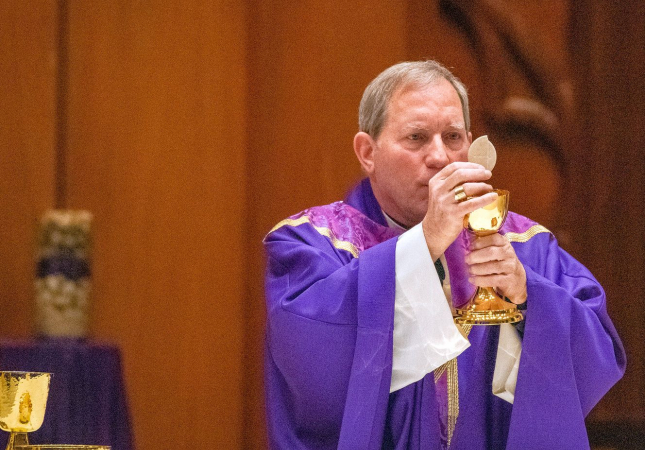
As we move toward the end of Lent, in the Gospel these days, we see the tension between Jesus and the Jews increase.
We hear today how some want to stone him. They tried again to arrest him, but he escaped from their power. How can Jesus convince them who he is? What he says doesn’t do it; what he does doesn’t seem to do it. There doesn’t seem to be anything that can convince them that Jesus is the Son of God.
But yet, we heard that those across the Jordan began to believe in him. I find it a bit comical how people can see the same exact thing, or hear the same exact words, and have quite different impressions or reactions.
A great mystery
But we see this today in our world. Why do some people truly embrace the Catholic faith or the Christian life, and many others don’t, and some quite directly reject it? Why are some people staunch believers, and others lack commitment? This is a great mystery.
Even within our own spiritual lives, there are times we have great faith, and other times we feel cold or tepid toward God, or even angry with God when things don’t turn out the way we want them to. It is ironic that we who ache for the love that only God can provide are at times unfriendly or halfhearted toward him. In other words, not all in. Why is this?
We were all created by God and for God, in his image and likeness. We were created from love and for love – to receive God’s love…and to share God’s love. God’s love is ever present, always presenting itself to us. But there must be an openness to it in every moment. We must acknowledge who God is and what he wants for us. And then be open to and desire the grace offered.
The people could not understand Jesus because their minds were closed to the ways that God can work. They had put God in a little box in their minds: “God works this way. He would never act in another way.” They did not recognize Jesus because he was different from what they expected.
Do we have God in a box?
In short, they did not truly know the Father, so they could not recognize his Son. What about us? Do we have God in a box? Is Jesus not the way we would like him to be? Have we created our own image of Jesus?
When we come to know, to love, and follow Jesus, then he reveals the Father to us. Jesus is the “exact imprint” of the Father’s nature (Hebrews 1:3), the true image of God.
The all-powerful, everlasting God became weak and mortal in order to introduce us to himself, that we might have life in him. Jesus had to become one of us in order to redeem us – to restore us. And although the devil did his best to get Jesus to rebel - tempting him, torturing him, having him experience injustice, betrayal, and rejection – Jesus remained faithful.
Victory over sin and death
By faithfulness to his mission, Jesus proved that God really does want to save us, not condemn us. By joining forces with Jesus, by accepting him as our Lord, by following his teachings and example, and by nourishing our souls on his grace as given by the Church, we become his partners in his continuing work of salvation. In this we share and expand his victory over sin and death.
This is what Jesus offered to the people in the Gospel. As we heard, some rejected it. People today reject it as well. But for you and me, let’s follow the example of the many who “began to believe in him.” Let us listen to John the Baptist and the wisdom of other saints, the voice of the Church, and to Jesus himself, and believe with our all our hearts, even when our hearts don’t “feel it”!
Friends, during these challenging times, Jesus is inviting us to take time to listen to him in prayer, to listen to him by reading his Sacred Scripture. Jesus continues to work hard in helping us to get to know him better. But we must take time to listen to him. Yes, even when our hearts don’t “feel it”!
It is in those times where the greatest graces are available to us.
-Bishop Robert Gruss